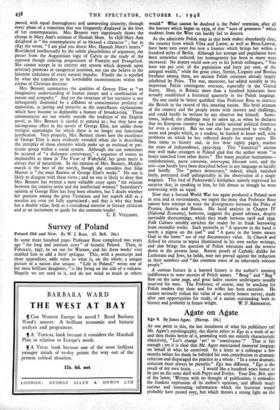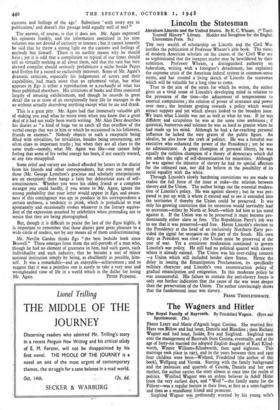Agate on Agate
Ego 9. By James Agate. (Harrap. 18s.) AT one point in this, the last instalment of what his publishers call Mr. Agate's autobiography, the diarist refers to Ego as a work of art and then thinks better of it, amending with not entirely characteristic objectivity, "Let's change `art' to `contrivance '." That is fair enough ; yet it is clear that Mr. Agate entertained immortal longings on behalf of what he contrived. In a letter to a colleague a few months before his death he belittled his own contribution to dramatic criticism and disparaged the practice as a whole : " In a sense dramatic criticism must always be parasitic." Ego was different. "Ego is the result of my own brain. . . . I would like a hundred years hence to be put on the same shelf with Pepys and Evelyn. Your Enc. Brit. says of the latter, ' Written with no thought of publication, it embodies the frankest expression of its author's opinions, and affords much curious and interesting information which the historian would probably have passed over, but which throws a strong light on the
customs and feelings of the age.' Substitute ' with every eye to publication,' and doesn't this passage hold equally well of me? "
The answer, of course, is that it does not. Mr. Agate expressed his opinions frankly, and the information oontained in his nine volumes was not devoid of curiosity or interest ; but it cannot honestly be said that he threw a strong light on the customs and feelings of anybody but himself. There is no earthly reason why he should have ; yet it is odd that a compilation so typical of our times should tell us virtually nothing at all about them, odd that the vain but very shrewd compiler should seriously prefabricate a niche beside Pepys and Evelyn for a record so exclusively introvert. Some of Mr. Agate's dramatic criticism, especially his judgements of actors and their capabilities, had much more than an ephemeral value, but what appears in Ego is either a reproduction or a,rechauffe of what has been published elsewhere. His criticisms of books and films consisted largely of amusing exhibitionism, and though he records in great detail the va et vient of an exceptionally busy life he manages to do so without actually describing anything except what he ate and drank.
This is a great pity. Mr. Agate had that immensely valuable gift of making you read what he wrote even when you knew that a great deal of it had not really been worth writing. Mr. Alan Dent describes his diaries as " a kind of huge vat to catch all that overflow of the verbal energy that was in him or which he occasioned in his followers, friends or enemies." Nobody objects to such a receptacle being filled with trivialities, for trivialities, besides being entertaining, are often clues to important truths ; but when they are all clues to the same truth—namely, what Mr. Agate was like—one cannot help feeling that some of his verbal energy has been, if not exactly wasted, at any rate misapplied.
Some relief and variety are indeed afforded by letters to the diarist from his friends and other correspondents, but over too many of these (Mr. George Lyttelton's gracious and scholarly interpolations are an exception) there hangs a faint but deleterious aura of self- consciousness. Whether you were his oldest friend or a complete stranger you could hardly, if you wrote to Mr. Agate, ignore the strong probability that your letter would appear in Ego, and aware- ness of this contingency was apt to produce in his correspondents a certain archness, a tendency to prink, which is prejudicial to true spontaneity and occasionally evokes whatever is the literary equiva- lent of the expression assumed by celebrities when pretending not to notice that they are being photographed.
But, though it is difficult to praise the last of the Egos highly, it is important to remember that these diaries gave great pleasure to a wide circle of readers, not by any means all of them undiscriminating.
Mr. Neville Cardus thinks Ego " the best bedside book since Boswell." There emerges from them the self-portrgit of a man who, though he had no element of greatness' in him, had such gusto, such individuality and such industry, that he became a sort of minor national institution simply by being, as ebulliently as possible, him- self. It was a remarkable—and an enjoyable—achievement ; and to suggest that it was a pointless one is surely to take a very sour and wrongheaded view of life in a world which is the duller for losing



































 Previous page
Previous page